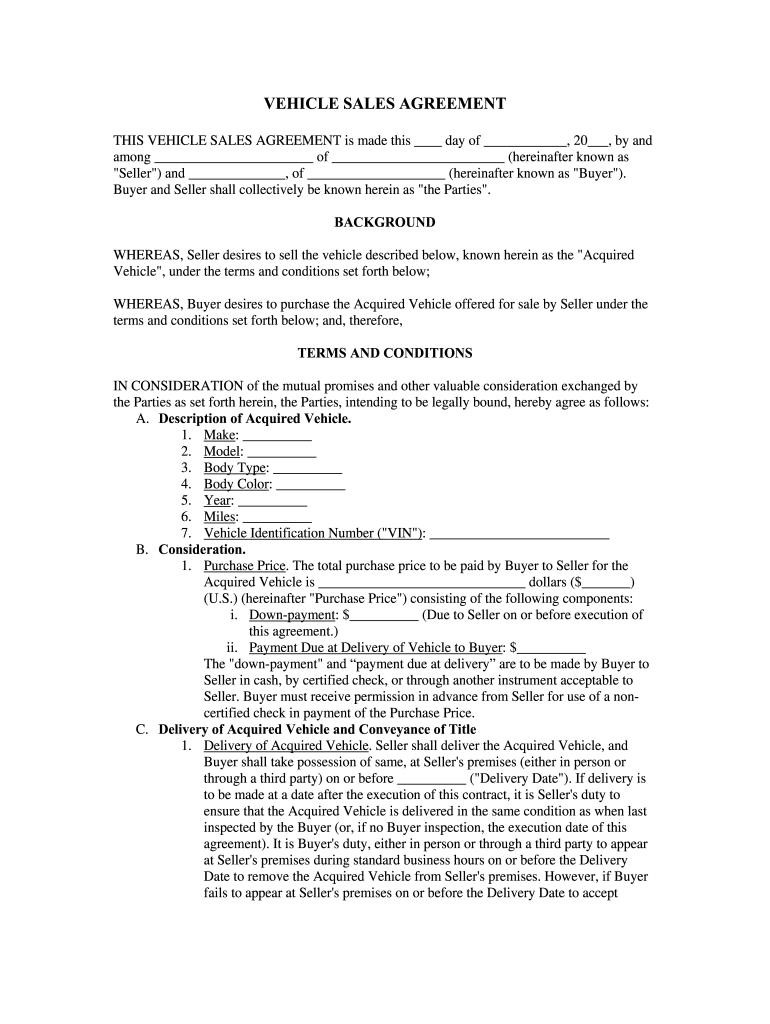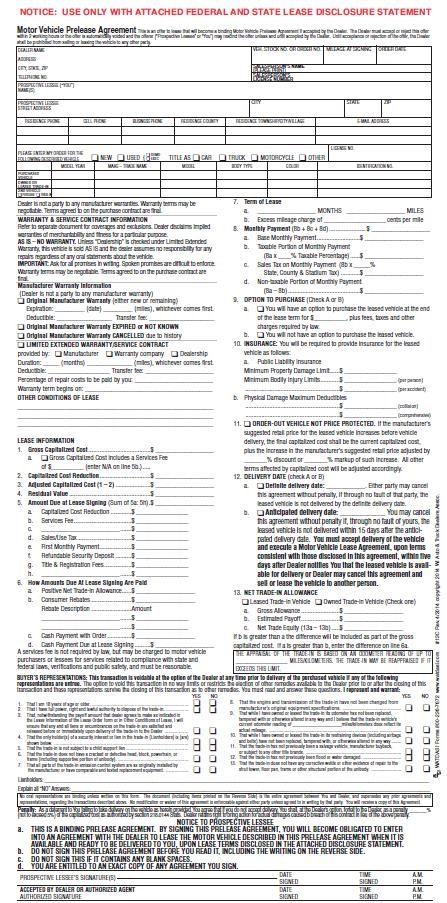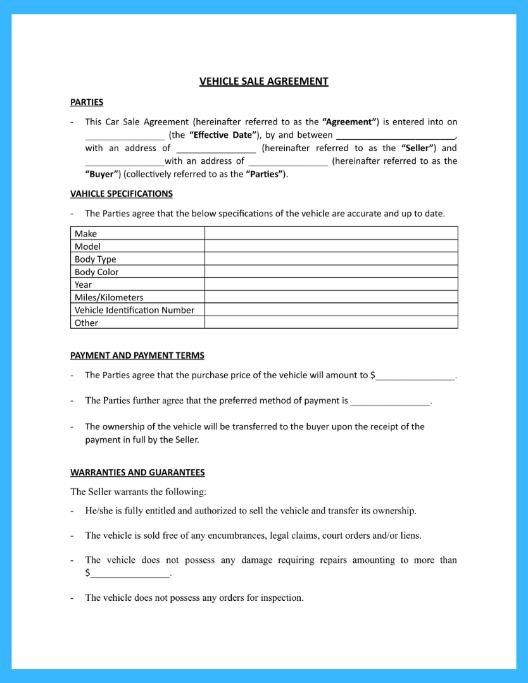
Car Dealer Purchase Agreement Form PDF⁚ A Comprehensive Guide
This guide explores car dealer purchase agreements, crucial legal documents outlining vehicle sale terms. We cover key elements, vehicle details, pricing, warranties, legal protections, financing, trade-ins, and finalization procedures. Learn how to navigate this essential process effectively.
Understanding the Car Purchase Agreement
A car purchase agreement, also known as a vehicle purchase agreement or car sale agreement, is a legally binding contract between a buyer and a seller (typically a car dealership) that details the terms and conditions of a vehicle purchase. It’s a crucial document that protects both parties involved in the transaction. This agreement outlines everything from the vehicle’s description (make, model, year, VIN) and purchase price to payment terms, financing options, warranties, and any applicable taxes or fees. Understanding this contract is essential before signing, as it legally obligates both the buyer and seller to adhere to its stipulations. Failing to thoroughly review and understand the agreement could lead to unforeseen financial or legal complications later on. Therefore, taking the time to carefully read and comprehend each clause is paramount to ensuring a smooth and satisfactory car buying experience.

Key Elements of a Car Dealer Purchase Agreement
Several key elements are consistently found within a standard car dealer purchase agreement. These essential components ensure a clear and legally sound transaction. Firstly, accurate identification of both the buyer and the seller is crucial, including full names and contact information. A precise description of the vehicle is paramount, encompassing the make, model, year, VIN (Vehicle Identification Number), and any additional features or options. The agreed-upon purchase price must be clearly stated, along with the payment method (cash, financing, or trade-in); Payment terms, including any down payment and the financing details if applicable (loan amount, interest rate, and repayment schedule), should be explicitly detailed. Warranties and guarantees offered by the dealer, encompassing their duration and coverage, also hold significant weight. Finally, the date of the agreement and the signatures of both buyer and seller are essential for legal validity and enforceability. Thoroughly reviewing these elements is crucial before signing the contract.
Vehicle Details and Specifications
The vehicle details section of a car dealer purchase agreement is critical for accuracy and legal protection. This part meticulously outlines the specifics of the vehicle being purchased. Crucially, the Vehicle Identification Number (VIN) must be precisely recorded; this unique identifier is essential for verifying the vehicle’s identity and history. The make, model, year, and trim level of the car must be accurately stated, preventing any ambiguity. Detailed specifications, such as the engine size, transmission type, color, and any additional features (e.g., sunroof, navigation system, premium sound system), should be listed. Mileage at the time of sale should be clearly documented to prevent future disputes. Any existing damage or imperfections to the vehicle must be noted, often accompanied by photographs or a detailed description to ensure transparency. The inclusion of options and packages purchased with the vehicle should also be thoroughly documented to ensure accuracy. This comprehensive description protects both the buyer and the seller, minimizing potential disputes regarding the vehicle’s condition and specifications.
Price and Payment Terms
The price and payment terms section of a car dealer purchase agreement is paramount. It clearly states the total purchase price, encompassing the vehicle’s base price, any additional fees (e.g., dealer preparation fees, documentation fees), applicable taxes, and any trade-in allowance. The agreed-upon price should be explicitly stated in both numerical and written formats to eliminate any confusion or potential discrepancies. The payment terms should detail the payment method (cash, financing, or a combination), the payment schedule (e.g., lump sum, installment payments), and any associated interest rates or finance charges if financing is involved. If a trade-in is part of the transaction, its value should be precisely defined, and any discrepancies between the trade-in value and the final sale price should be clearly explained. The inclusion of a detailed breakdown of all costs involved ensures transparency and prevents disputes. Buyers should carefully review this section to understand the complete financial commitment. This section’s clarity safeguards both parties by preventing misunderstandings about the financial aspects of the vehicle purchase.
Warranties and Guarantees
The warranties and guarantees section of a car dealer purchase agreement is crucial for outlining the protection offered to the buyer. This section specifies the type of warranty provided (e.g., manufacturer’s warranty, dealer warranty, or an “as-is” sale with no warranty). If a manufacturer’s warranty exists, its duration and coverage should be clearly stated, including any limitations or exclusions. A dealer-provided warranty, if offered, should detail its terms, including the duration, covered components, and any deductibles or limitations. Crucially, the “as-is” clause, often present in used car sales, explicitly states that the vehicle is sold without any warranty, implying the buyer assumes all responsibility for future repairs. Understanding the warranty implications is vital; it dictates the extent of the dealer’s responsibility for post-sale repairs or defects. Buyers should meticulously review this section, clarifying any ambiguities with the dealer before signing the agreement. The specifics of the warranty—or lack thereof—significantly impact the buyer’s financial risk and long-term ownership experience. A comprehensive understanding of this section is essential for informed decision-making.
Legal Aspects and Buyer Protections
The legal aspects of a car dealer purchase agreement are multifaceted and designed to protect both the buyer and the seller. For buyers, understanding these aspects is paramount. The agreement serves as a legally binding contract, outlining the responsibilities and obligations of each party. Crucially, it details the vehicle’s description, including the Vehicle Identification Number (VIN), make, model, and year, preventing disputes about the identity of the vehicle. The agreement should clearly stipulate the purchase price, payment terms, and any applicable taxes or fees, safeguarding against discrepancies. State-specific regulations on vehicle sales and consumer protection laws often influence the agreement’s contents, offering buyers further legal recourse in case of disputes or breaches of contract. Buyers should be aware of their rights under these laws, which may include provisions for resolving disputes through arbitration or mediation. Furthermore, the agreement might address issues such as odometer disclosure, ensuring the accuracy of the mileage reading, and protection against undisclosed vehicle damage or defects. Thoroughly reviewing and understanding these legal aspects is crucial before signing, protecting buyers’ interests throughout the purchase process.
Financing Options and Implications
The car dealer purchase agreement often incorporates details about financing options, a crucial aspect for many buyers. These agreements clearly outline the financing terms if the buyer chooses to finance the purchase rather than paying in full. The agreement will specify the loan amount, the interest rate, the loan term (duration), and the monthly payment schedule. Understanding these terms is essential, as they significantly impact the overall cost of the vehicle. Buyers should carefully review the Annual Percentage Rate (APR), which reflects the total cost of borrowing, including interest and fees. Hidden fees or prepayment penalties should also be clearly identified within the agreement. Comparing financing offers from different lenders is advisable before committing to a specific plan. The agreement might also detail provisions for early repayment, late payment fees, and default clauses. Buyers should consider the implications of choosing a longer loan term versus a shorter one, acknowledging the higher total interest paid over a longer period. It’s crucial to understand the implications of defaulting on the loan, including potential repossession of the vehicle. Before signing, buyers should fully grasp all financing terms to make informed decisions aligning with their financial capabilities and long-term goals.
Trade-in Considerations
A significant aspect of many car purchases involves trading in an older vehicle. The car dealer purchase agreement explicitly addresses this, detailing the terms of the trade-in. Crucially, the agreement will state the trade-in vehicle’s make, model, year, and Vehicle Identification Number (VIN). The agreed-upon trade-in value will be clearly listed, impacting the final price of the new vehicle. It’s essential to understand that the trade-in value might differ from the vehicle’s market value; dealerships often offer lower values to increase their profit margin. Buyers should research their vehicle’s fair market value beforehand to ensure they receive a reasonable trade-in offer. The agreement should specify how the trade-in value is applied to the purchase price – either as a direct reduction or as part of the financing. Any outstanding loans or liens on the trade-in vehicle should be addressed within the agreement, clarifying how these will be settled. The condition of the trade-in vehicle plays a role in determining its value; any existing damage or mechanical issues should be documented to prevent disputes later. Buyers should carefully review this section of the agreement, ensuring the trade-in details are accurate and fair. Negotiating the trade-in value is possible, and buyers should be prepared to do so if they feel the offered value is too low. A thorough understanding of the trade-in process before signing the agreement is paramount.
Signatures and Finalization
The final stage of the car purchase process involves the signing of the agreement by both the buyer and the dealer. Before signing, it is absolutely crucial to thoroughly review every aspect of the document. Ensure all details, including the vehicle’s description, price, payment terms, warranties, and trade-in value (if applicable), are accurate and reflect the agreed-upon terms. Don’t hesitate to clarify any ambiguities or ask questions if anything is unclear. Once both parties have signed, the agreement becomes a legally binding contract. The dealer will typically provide copies of the signed agreement to both the buyer and themselves. This signed document serves as proof of the purchase transaction and protects both parties’ interests. Depending on the dealership’s procedures, additional paperwork, such as the title transfer, may need to be completed. Obtain all necessary documentation before leaving the dealership to avoid potential future complications. Retain your copy of the signed agreement in a safe place for your records. It is important to understand that this document represents a legally binding commitment; carefully review and understand all provisions before affixing your signature. This step finalizes the purchase, transferring ownership of the vehicle from the dealer to the buyer. By signing, both parties acknowledge their understanding and acceptance of all terms and conditions outlined in the agreement.
Downloadable Templates and Resources
Numerous online resources offer downloadable car dealer purchase agreement form PDFs. These templates provide a framework for creating a legally sound agreement, but it’s vital to remember that they are not a substitute for professional legal advice. While these templates can save time and effort in drafting a contract, they should be used cautiously and adapted to fit the specific circumstances of each transaction. Always ensure the template accurately reflects all aspects of the deal. Websites specializing in legal forms often provide customizable templates; however, it’s advisable to seek legal counsel to ensure compliance with all applicable state and local regulations. Before using any downloaded template, carefully review the terms and conditions to confirm its suitability for your needs. Consider consulting with an attorney to review the completed agreement before signing, particularly if the transaction involves a significant financial commitment or complex details. The availability of free templates should not diminish the importance of a comprehensive understanding of the legal ramifications of a car purchase. Remember, using a generic template does not guarantee a legally sound and protective agreement. Using a template is merely a starting point. Professional legal guidance ensures protection for both buyer and seller.

No Responses